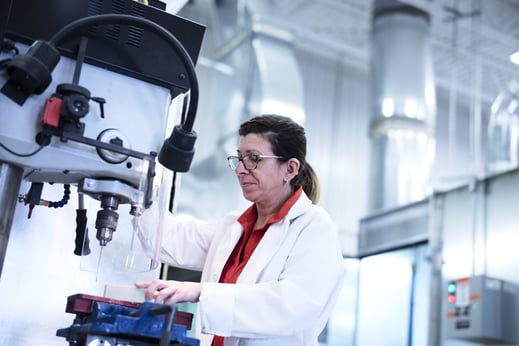ULTEMTM 9085 is a polyetherimide (PEI) thermoplastic that is getting a lot of attention. It is one of the most popular 3D printing materials in manufacturing for 3D printing. What are the reasons? Let's look at the benefits that this thermoplastic brings and its various applications.
Why 3D-Print Parts with ULTEM 9085?
Here are the main reasons why ULTEM 3D printing can benefit you.
A Material with Unique Properties
ULTEM 9085 is a high-performance, flame-retardant thermoplastic. It offers a high strength-to-weight ratio, and excellent resistance to heat, chemicals, and impact. This thermoplastic is also FST FAR25.853 certified for flame, smoke, and toxicity standards.
Another important fact is that the ULTEM 9085 thermoplastic meets rigorous test criteria and retains the traceability required by the aerospace industry. The analysis certificates document test results and pairs the lot numbers of the raw material with the filament. This allows full traceability from the printed part to the raw material.
ULTEM 9085 and 3D Printing: Multiple Applications
ULTEM's properties make it a sought-after material in the aeronautics, aerospace, and automotive sectors. This material is used to produce low-volume end-use parts, functional prototypes, or tooling.
For example, ULTEM 9085 3D printing can be used for the manufacturing of components intended for the interior of aircraft, such as various types of ducting. ULTEM 3D printing can also be used for prototypes for high-demand applications and specialized tooling such as jigs, fixtures or lightweight high-strength composite molds.

Reduce the Cost of Parts by Opting for 3D Technology (Trademark of Stratasys)
According to common practice, the industry generally manufactures thermoplastic parts through 3D printers defined as “open”. Although this technology has proven itself, it does have certain limitations. In fact, some materials such as ULTEM, by their properties, can be difficult to print. The parts produced can then display an exorbitant price. Opting for Stratasys' 3D printing technology makes it possible to counter these problems and ensure the success of your projects. As a result, printed parts are generally priced competitively for higher-end materials.
Solaxis has a selection of Stratasys 3D printers, one of the largest in the country. Thus, our team of engineers can support you in developing and designing thermoplastic parts with complex geometries by combining short manufacturing times, large production capacity, and competitive prices.
Questions about 3D printing and ULTEM? Contact us, it will be our pleasure to help you.





